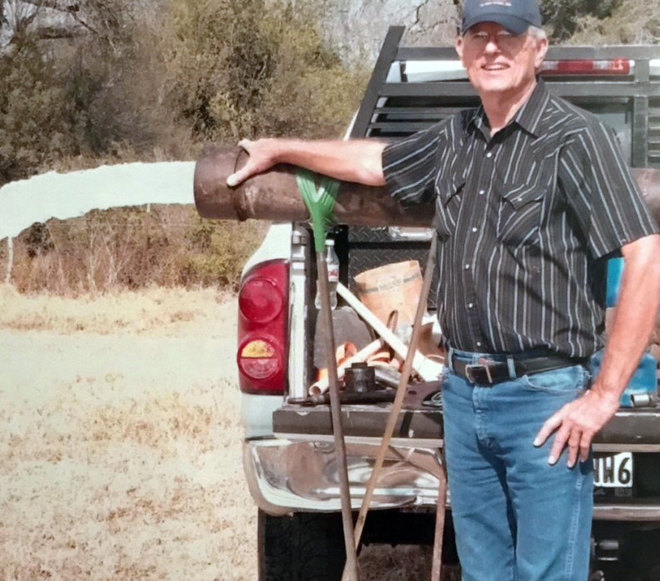
Enjoying the best of two worlds, Fred Yanta says that he is an alumnus of both Devine and Karnes County schools. Having lived all his life in the Panna Maria community (the oldest Polish settlement in America, having been founded in 1854) and attending school in Karnes County until the age of 17, he was dismayed when his father sent him to live with an aunt on the newly acquired farm northwest of Devine. Edwin Yanta, Fred’s older brother, was establishing the farm when he was drafted. So, the responsibility of keeping the farm in operation fell upon Fred.
Thus, Fred had to complete his final year of high school in an entirely new community, leaving life-long friends and family. However, he is quick to say that, ultimately, he built another circle of life-long friends in Devine. And, Fred fondly recalls his DHS principal, Tony Petri, and ag teacher, Henry Moss. Graduating from DHS on May 24, 1964, Fred enjoys attending his high school reunions from both Devine and Karnes City ISD.
Looking back 55 years, Fred reminisces of how it was…. The local eating establishments consisted mainly of the Lunch Basket and Warhorse Café. Weekly shopping was accomplished at Schott’s Model Market, Savage Foods, and Loggins and Lilly “where you could buy ‘everything from a rat skin to a ranch’.” Real estate prices still reflected the seven-year-drought of the 1950s, with land selling for $75-125 per acre. Gasoline cost .23-.27 per gallon; farm diesel was .12 per gallon; hamburgers were .25 and a coke was a dime.
Fred learned to be resourceful and independent at an early age. But, first, upon graduation, his class took an eight-day senior trip (in the luxury of Devine school buses) to Denver, CO, with stops along the way to Carlsbad Caverns, The Royal Gorge, Santa Fe, Colorado Springs, and Pike’s Peak. Afterwards, Fred and his brother farmed their land together before later transitioning to farming their own operations.
Always looking for a better way, Fred says he typically looked “outside the box” in search of new ideas and strategies to improve yields and profitability. His goal was to “simply make every acre of land a productive one, whether it was irrigated or dry-land.”
The land on Fred farmed between Devine and Yancey is comprised mainly of sandy loam soils, land that Fred learned is very conducive to hay production. Thus, in 1998, after 34 years of farming, he started evolving from grain, cotton, and vegetable production to irrigated coastal hay. He found that he could produce a good quality hay for the hill country horse operations.
Fred’s hay production earned national attention. In 2001, he entered a bale of his coastal hay in the Medina County Hay Show and won 1st place! The bale was then sent to the State Hay Show, and there it won 10th place. Subsequently, in 2002, Fred again entered the Medina County Hay Show and again won first. This entry was then sent to the State Hay Show and was awarded Grand Champion in the Coastal Division. “This marked the first time ever that a hay producer from South Texas had won the State Hay Show in the Coastal Hay Division,” he states. But, what is more, his hay was then entered into the National Hay Show held in La Fayette, LA, in 2003. There it won Champion of Show – 3rd place! After this notoriety, Fred said he no longer needed to advertise his hay farm, as calls for his hay far exceeded his ability to fill them.
Being civic minded, Fred joined various Medina County Ag organizations: the Hondo Area VII Young Farmers of Texas in which he held various offices; the Medina County Crops Sub-Committee in which he served as president; the county crops committee in which he worked closely with County Agent Glenn Bragg and other members on the crops committee to research new methods to increase yields and profitability. In both 1975 and 1981, Fred’s farming operation was judged Best in Area VII, and he was presented with the Area VII Star Young Farmer Award.

Fred’s county involvement and participation attracted the attention of the Ag lender and the owner of Hondo National Bank. They invited him to become an Advisory Director in 1971; at the time, he was only 25 years old. Five years later, Fred was elected to the Board of Directors. Today, Fred continues to serve as a Director and proudly acknowledges the incredible growth of the bank, which now has branches in Uvalde, Bandera, Leakey, and Blanco. “The success of the bank,” Fred states, “is due in large part to its outstanding CEO, Tim Gilles, to a Board of Directors that brings years of diverse business experience to the table, and to a workforce of 52 dedicated employees.” He adds, “Being an integral part of one of the most successful medium-sized banks in the state is a highlight of my career.”
About Fred’s 48-year tenure at HNB, President and CEO Tim Gilles says, “As a Director, Mr. Yanta has provided valuable knowledge and support to Medina County as it has grown and prospered…and all of us at HNB are very happy to see Fred being honored for his many years of dedicated service to both Medina County and to HNB.” In a few months, Fred will become the longest tenured Director and/or Advisory Director HNB has ever had since its creation in 1901.
Another of Fred’s contributions is his service from 2003-2010 as a board member of the Medina County Groundwater Conservation District. Its purpose is to ensure that rules and regulations are developed and followed in regard to water-well drilling and water usage, as proper limitations will keep an aquifer from being over-pumped. The MCGCD is vitally important as the populations of the county and the demands for water rapidly grow.
On the subject of water, Fred has become a valuable asset to the extended community as one who accurately locates water wells – a talent sometimes known as “dowsing for water.” Even though both his father and great grandfather possessed this talent, Fred admits, “I was as skeptical as anyone could possibly be about locating water.” However, after his first successful completion in 1982 in Burnet County for his sister, Dr. Shirley Ann Yanta, Fred has located over 300 wells in Atascosa, Bandera, Frio, Karnes, Medina, and Uvalde counties. “I located the first two wells for the Benton City Water Supply Co.,” he proudly states.
Explaining that dowsing for water is more of an art than a science, Fred admits that, along with his many successes, he has had some dry holes. But, having discovered and developed a mathematical formula to which underground streams adhere; Fred says that the incidence of “dry holes” has decreased substantially. He has discovered wells in the South Texas aquifers in depths as shallow as 24 feet and as deep as 2,720 feet.
Discovering these wells and “seeing successful completions of water wells that turn previously dry fields into lush hay fields and other crops, while utilizing pivot systems and other methods, noting that ranchers have ample water for their livestock and wildlife, and noticing previously brown yards covered with green lawns gives me great satisfaction,” Fred says. He adds about his water projects, “Having water helps make ideas become a reality.”
A few years ago, Fred sold the farm and currently spends most of his time between Austin, San Antonio, Devine, Hondo, Uvalde and Karnes City with his significant other, Esther Hitzfelder (1970 DHS Salutatorian). He continues to stay active in banking, in real estate investment, and in locating water wells. In addition, he is considering adding travel into his already full schedule.
Meanwhile, Fred enjoys a wonderful relationship with his family. He and his former wife, Dorothy Reischman, have two children, Michelle Bender and Chris Yanta, and five grandsons. Michelle and her family live outside Port Lavaca near Matagorda Bay. Chris and his wife Heather and their three sons live on their ranch west of Devine. Fred enthusiastically states that “having a career in Medina County has proven to be a great decision!”